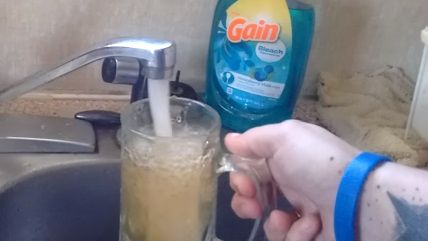Here's How to Fix Flint's Water System: Privatize It
A privately-run water system is more accountable to the people.

Social media sites are awash in pictures of Flint's awful water. Local children exposed to lead will likely face long term health consequences—and it appears that kids suffer from high lead levels in many Michigan cities.
Amidst revelations that the state of Michigan made sure its Flint employees had clean water long before taking action on the rapidly declining tap water, maybe shame will at last lead state and local officials to look at how to fix the water utility. And maybe other localities can start thinking about how to best prevent the next mass water poisoning.
It isn't rocket science. There are more than 50,000 water utilities in the United States, and more than 50,000 of them are providing safe drinking water. When things go wrong—as they did in Flint—bad political and management decision are to blame.
On the political side, it is clear that state and local officials papered over the crisis as long as they could, apparently hoping for some miracle to save them from facing the music. Paul Krugman blames stingy Republicans trying to save money, part of the left-wing narrative that presumes more spending would have prevented the crisis.
But as Reason's Shikha Dalmia has reported, Flint's water decisions were driven by dreams of economic stimulus. Officials knowingly chose a more expensive approach widely predicted to experience delays. These delays left the city with nothing but nasty water.
Meanwhile, the utility managers who were supposed to ensure the water coming out of taps was safe, and the state regulators who oversaw them, botched the job. Improper testing protocols and practices, on top of bad political decisions, made it hard for consumers to discern the emerging problem and allowed the utility to provide toxic water to people's homes for months.
It is very unlikely any of this could have happened if Flint's water utility had been private. Maybe with Walmart, Coca Cola, Pepsi, and other companies overcoming their greed to donate massive amounts of bottled water to Flint residents, suspicion of privatizing water utilities will lessen.
Nearly 75 million people in the U.S. get their water from a private utility: almost a quarter of the population. Most probably don't even know it. And about 1,000 cities in the country have hired a private company to operate their publicly-owned water utility.
This is a long running practice. Back in the 1990s, President Bill Clinton's Environmental Protection Agency said that privatizing water utilities "can be used by communities to provide needed environmental services more efficiently" and "can be used as a way to provide substantial benefits to both the public and private sectors, creating the classic 'win-win' situation." Indeed a number of communities privatized their water utilities in order to get them into compliance with EPA safe-drinking-water standards. Under government operation, they would have never gotten there.
Flint residents could learn from the example set by Milwaukee, Wisconsin. In 1993, Milwaukee's water supply suffered an outbreak of cryptosporidium and had to invest big bucks in new filtration. Since the most likely culprit was their own sewage going into Lake Michigan, they privatized their wastewater utility and required the private company to clean the water even more thoroughly than the EPA requires. Over 20 years later, privatization is still going strong for Milwaukee.
This illustrates a key difference between public and private water utilities—oversight. If Flint's water utility had been private, it would not have been allowed by state regulators to provide toxic water to citizens. Workers would have been forced to make the investments to fix the problem in the most cost-effective manner.
But it probably would not even have come to that. Private utilities simply borrow the money to build new water supply pipelines or treatment plants when they need them, and they have every incentive to build them fast and keep costs down. In contrast, for a municipal utility it is a long and painful political process, fighting against other agencies and political priorities, to get approval to borrow money to build new facilities. And that process can be hijacked by all manner of politics, just as stimulus fever hijacked the Flint project.
Private utilities are also much more accountable to the customers. The citizens of Flint cannot sue the government agencies that provided them toxic water (thanks a lot, sovereign immunity). But private utilities enjoy no such immunity, which means that avoiding liability from providing bad water is a high priority.
It's true that privatization of water utilities has pros and cons, but consider that every year about 100 communities that have privatized their water system have the contract come up for renewal—or cancelation—and every year, more than 90 percent of those communities decide to stick with privatization. These folks are obviously much happier with their private water utility right now than Flint citizens are with their government-run one.
Dr. Adrian Moore is vice president of policy at the Reason Foundation.
